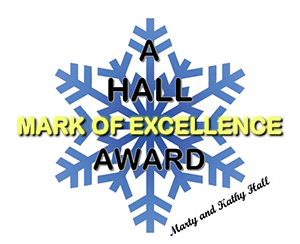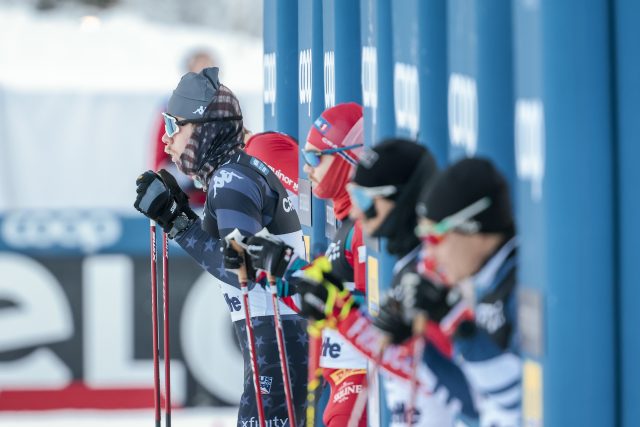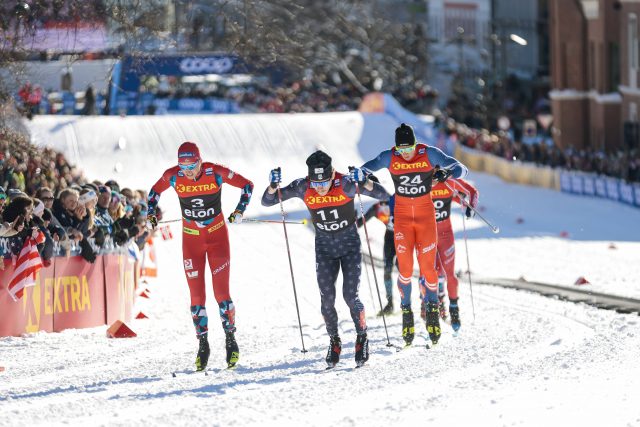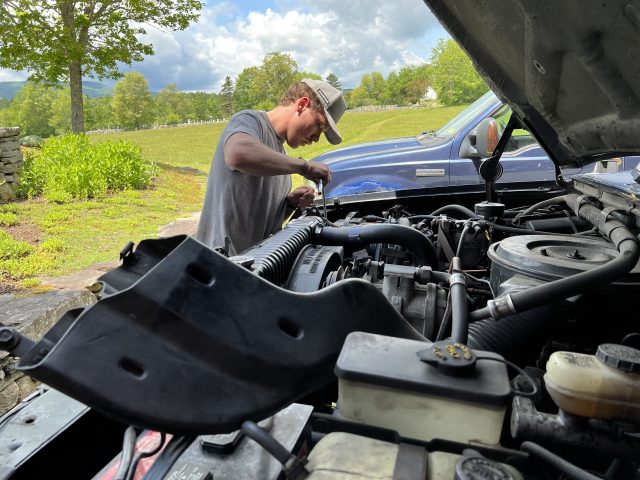 This coverage is made possible through the generous support of Marty and Kathy Hall and A Hall Mark of Excellence Award. Learn more about A Hall Mark of Excellence Award—or about supporting FasterSkier coverage—by contacting info@fasterskier.com.
This coverage is made possible through the generous support of Marty and Kathy Hall and A Hall Mark of Excellence Award. Learn more about A Hall Mark of Excellence Award—or about supporting FasterSkier coverage—by contacting info@fasterskier.com.

People are always asking Ben Ogden, “How does it feel to be on the start line with Klaebo, Jouve, Chanavat?” His response reveals much about both Ogden’s attitude as a competitor, and his character as a young man:
“For me, it’s not really a question of how it feels on the starting line,” he says. “It’s more a question of how it feels during the race. Klaebo goes by me, and I’m like, ‘That was bound to happen at some point.’ And it’s true, but if that’s what I’m thinking every time he goes by, then what am I even doing here? I would be a lot better skier if when Klaebo gets by me I was thinking, ‘Alright, how am I going to get back in front of him?’ Even if I spend the next ten years chasing him and never once beat him, I might as well stop now if I don’t believe I can ever beat him.”
“In terms of the consistency of Klaebo’s performances, it’s nuts. Nobody else makes a final more than 40% of the time (Klaebo always makes the final). AND what about some guy falling in front of you, or some guy stumbling in front of you, or getting boxed out, or someone stepping on your pole? For Klaebo, that NEVER happens. The rest of us, that happens all the time and we’re just like, ‘Oh, that’s sprinting.’ But that’s sprinting for 99% of us; for 1% of us (Klaebo) that’s not the sprint event he’s entered in. Sprinting is something very different for him than it is for us.”

Summer of the Double Pole
When asked about changes he intends to make in his training strategy this summer, Ogden’s ideas were more about refinement than wholesale change:
“Not anything too drastic,” he said. “But one of my big goals is about the first minute and the fourth minute of a sprint heat. Look at me in Drammen: my double poling in the first minute is pretty good, though in the fourth minute it’s atrocious. Double poling feels like NOT my strength because I get out-double poled at the line routinely. But the reality of it may be that others are better at maintaining good technique—getting up high, not getting frantic—when they’re tired. One of my big goals this summer is, when we do speeds, to change up the level of anaerobic stress.”
“Usually when we do double-pole speeds we’re fully rested (heart rate maybe 90 BPM). That’s great, but I’m like, ‘Maybe we should do L3 or even L4 before your speeds—watch your video THEN.’ I think the program (for me) should involve more stressed speeds. Concentrate on the fifth, sixth, seventh effort. It’s so easy to fall into the mistake of just going ‘tempo.’ When you’re fresh, you’d just commit to ‘strength.’”
“That’s mainly what I took away from this season. It was funny: at the beginning, I was like, ‘Oh, my double pole’s not good enough.’ But then I was watching some video this spring; actually my double-pole isn’t too bad. It really is my finish—my final 100—that’s not great. And that’s a different thing. I may be double-poling the final 100, but it’s not that my double-pole technique is problematic. It can certainly get better, but the most important training may be learning how to avoid getting frantic when I’m tired. That’s a big thing on my mind this summer.”
Therein lies the true challenge in sprinting: to practice being present, to focus on what I can do to optimize my own situation and not be distracted by what everybody else is doing.”
Ogden confessed to being affected by other racers in the most challenging moments of any sprint heat—the final 100 meters. He spoke to his own propensity to increase tempo too radically, to rely on speeding up rather than powering through, to fall into patterns of franticness rather than sticking with his strengths:
“I definitely find myself thinking ‘they’re faster than me! They’re coming!’ Ultimately, I’d be better off concentrating on getting myself to the finish line as fast as possible.”
“When you’re on the World Cup, it’s easy to look around and think, ‘Everybody else here is more professional than me.’ Then when you’re out there racing with them you may lack belief in yourself. Therein lies the true challenge in sprinting: to practice being present, to focus on what I can do to optimize my own situation and not be distracted by what everybody else is doing.”
In His Element
Southern Vermont: Ben Ogden is at home here. It’s the place that he knows and loves, the place where he works and tinkers, the place where he plans and trains, the place where the ski community gathers. It’s an important part of who he is:
“The community here is unbelievably motivating,” Ogden confessed. “They view me as being motivating, but I view them as being motivating for me! They really care, and people in this part of the world are really excited to see me have success. And I’m really proud to be a part of that. And an important aspect of that is to be here, to be a part of the community. When I’m in Europe thinking about who’s cheering for me on the TV, a lot of those people live with a 10 mile radius of right here. That’s a really special feeling. The people here are going to be supportive when things are not good, and they’re going to be supportive when they are good.”
Referring to the enthusiasm of the Vermont ski community (and to the huge spectator turnout at a recent end-of-season on-snow event that featured SMST2 racers), Ogden said, “Look at what happened at [Magic Mountain] the other day! You just don’t get that everywhere! That’s due to a ton of different things—me being a teeny tiny part of it. But the fact that I am even a part of it is just so cool. For being such a small, remote part of the world, there’s a lot going on here, a lot of people making things happen. I respect that so much, and I’m so proud that this is my home.”
“In skiing you can get a lot of reward—a lot of positive reinforcement—for your efforts. But it all comes in the winter time. The rest of the year is about grinding: it’s fun to train, but you don’t get a lot of satisfaction out of that. So, it’s fun to have this other stuff . . .
“And—being home—I can do stuff like this (gesturing to the pile of carefully labeled parts that will one day become his Series III Land Rover), I can do other things, work in the shop, learn how to weld. I don’t have a lot of desire to just train and sit in my bed. Maybe that would be the best thing for my training, you know? It probably would be, but for me I just crave the Vermont lifestyle. If your truck has dead batteries, then you putter around with it for the afternoon and you fix it. If you want to go camping, you go camping. It’s awesome. I love it so much.”

John Teaford
John Teaford—the Managing Editor of FasterSkier — has been the coach of Olympians, World Champions, and World Record Holders in six sports: Nordic skiing, speedskating, road cycling, track cycling, mountain biking, triathlon. In his long career as a writer/filmmaker, he spent many seasons as Director of Warren Miller’s annual feature film, and Producer of adventure documentary films for Discovery, ESPN, Disney, National Geographic, and NBC Sports.



